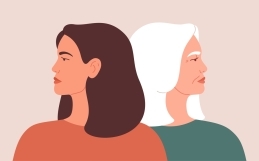Most of us go into marriage with excitement, passion, and hope for our future. We boldly move forward with full conviction that we’ll have a different marriage than our parents did, and that the divorce rate won’t apply to us. After all, we’re marrying our soul mate, our perfect match , our best friend. What could go wrong? Fast forward a few years, and many of us find ourselves with heavy eyes from exhaustion, baby drool on our clothes, and resentment that could fill a football stadium. Where did all that early excitement go? And what has become of those star-crossed soulmates? Who are they now? Co-parents? Colleagues? Associates? Roommates?
For many of us, the years that pass following our wedding day creates increasing separation between us and our spouses. We become different people with the passing of time, and many of us grow to believe that our hopes of being together until the end of time are more of a fairy tale than a reality. On holidays, the exciting gifts we used to exchange turn into kitchen supplies and slippers. Our nighttime cuddles are a thing of the past. The gap in the bed between us and our partners reflects the metaphorical space between us. Over time, many of us come to accept that maybe we are just a soon-to-be divorce statistic; or, even worse, maybe we’re just like our parents.
As a therapist, I’ve heard spouses exclaim, “This isn’t what I signed up for!” “This isn’t how I imagined it!” and “This isn’t the way it was supposed to be!” more times than I can count. So many of us have been taught to believe that our spouses and families should be the source of our happiness. But the American dream has let us down. The idea of marriage and family being a perfect, drama free place where we find our happily ever after is a sham. Walking away is painful, but feeling stuck like a zoo animal is suffocating. So, what can we do? Who can we turn to? The answer is pretty simple, actually: We can turn toward ourselves and take a look at our family history.
In marriage, we often engage in behaviors that serve to help us avoid the problems we experience within our relationship and ourselves. We’re masters at avoiding our emotions and partaking in counterproductive methods to distance ourselves from how we feel. Without knowing it, many of us are subconsciously repeating patterns from our family of origin that take a lot of energy and leave us feeling stuck and crippled. That’s why being aware of ourselves and our relationship patterns is so important. Once we know why we’re doing what we’re doing and realize that these behaviors don’t lead to any progress, we can find the strength to make more intentional choices that will improve our marriage. Since all people engage in these relationship patterns, there’s nothing to be ashamed of. The behaviors that we engage in that aren’t helpful to our marriage are actually attempts to manage our anxiety. They aren’t intentional or done on purpose to hurt the one we love; they’re done to make us feel more comfortable in the moment.
As important as they are, emotions can create many difficulties in our marriage. Paradoxically, the emotions that lead us to fall in love can be the very same ones that destroy our relationship. I think of the emotional intensity in relationships as a way that anxiety is being expressed; whether it comes in the form of anger, frustration, or argumentativeness, this expression of anxiety hinders our ability to connect with our partner. The more anxious we are when we get into a relationship, the more susceptible we are to becoming highly reactive to our partner. Also, the less we know ourselves before we get into a marriage, the more reactive we are, because we’re looking to our partners to complete us. When our romantic relationship serves as a way for us to feel emotionally complete, we become highly sensitive to our partner. Often, we learn from our culture, our family, and our friends that we should find someone who completes us. But when we look for a relationship to complete us, rather than seeing ourselves as complete on our own, we start using our relationship as a way to emotionally regulate ourselves; we rely on it to provide us with the motivation, support, self-esteem, or soothing we might be lacking.
Trying to create one full person out of two incomplete ones will not only be ineffective, it will also create more anxiety for both you and your partner. In an effort to manage that anxiety, you’ll likely partake in predictable and well-documented relationship patterns that can intensify over time. Dr. Murray Bowen recognized a few of these patterns in particular: conflict, distance, cutoff, over- and underfunctioning, and triangulating. For Bowen, these are universal patterns that transcend culture, race, and ethnicity. When we engage in these different behaviors, we completely miss the original problem of not being a complete self and replay past emotional patterns. The good news is that in any relationship, if both people are willing to work on themselves, their relationship and anxiety will improve. But first, they need to be aware of the relationship patterns that get in the way of improving themselves and their relationship. In future articles, and in my upcoming book, I’ll be discussing our relationship patterns in more detail, and shining some light on what we can do to make changes.
Did you enjoy reading this article?
Once a week I send out a newsletter with new articles and unique content for readers. It is my way of staying in touch with you and giving you free advice based on some important topics.
Click here to sign up for my newsletter.
Get a copy of my popular book “Its Within You.” It is a guide to help you to live within and cultivate your sense of purpose. https://amzn.to/2LP2pNL
Talk soon,
Dr. Ilene





